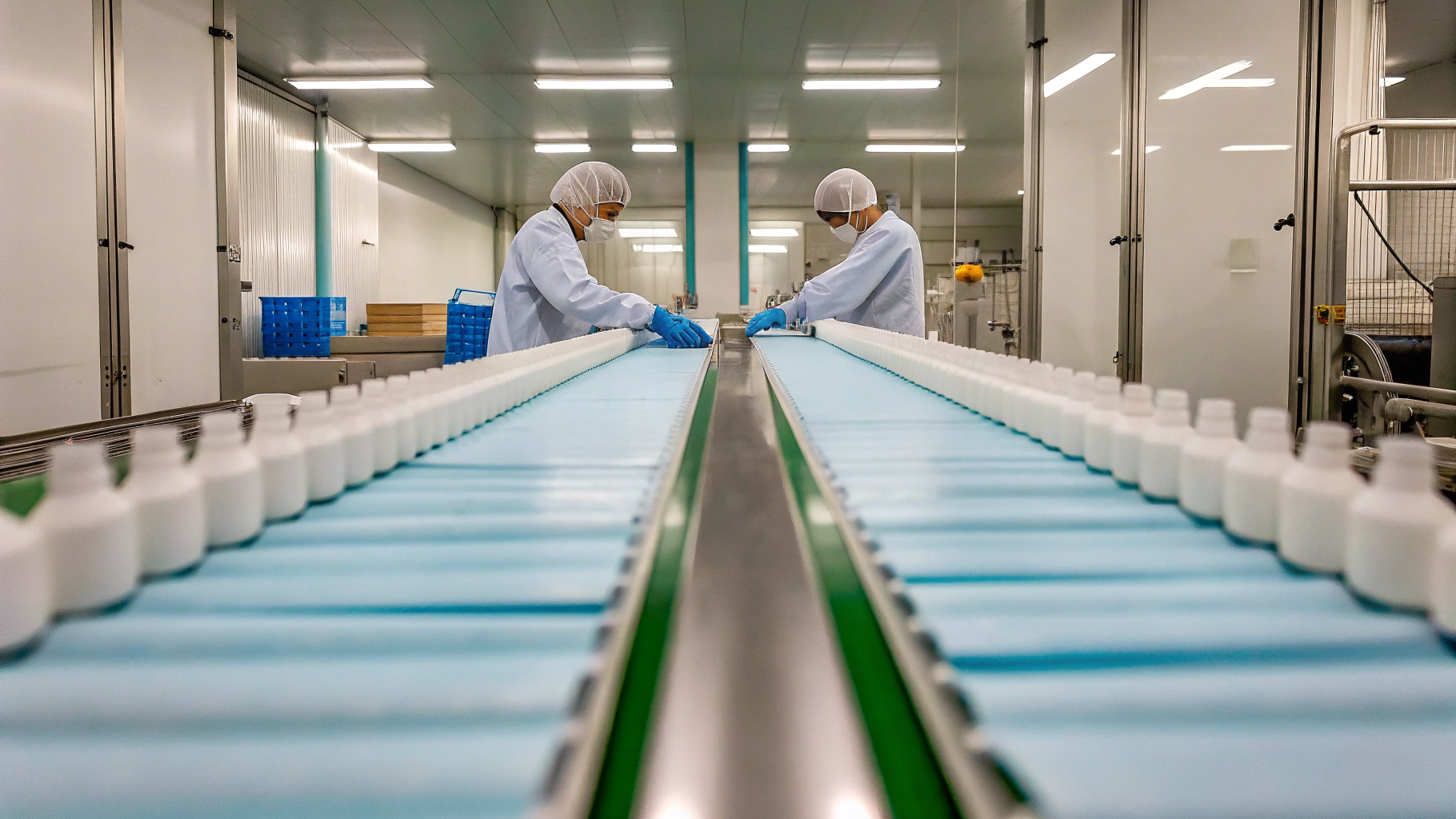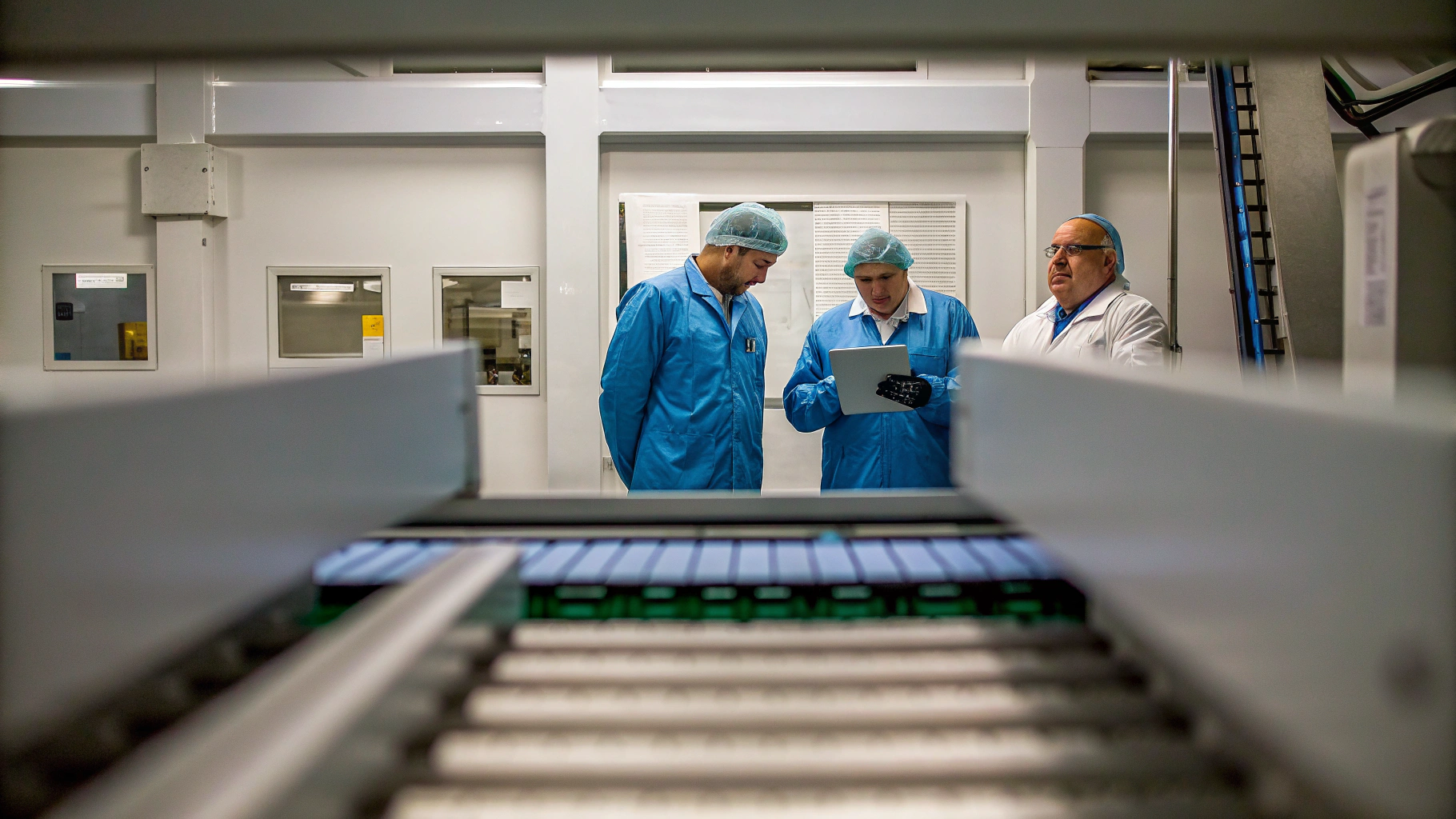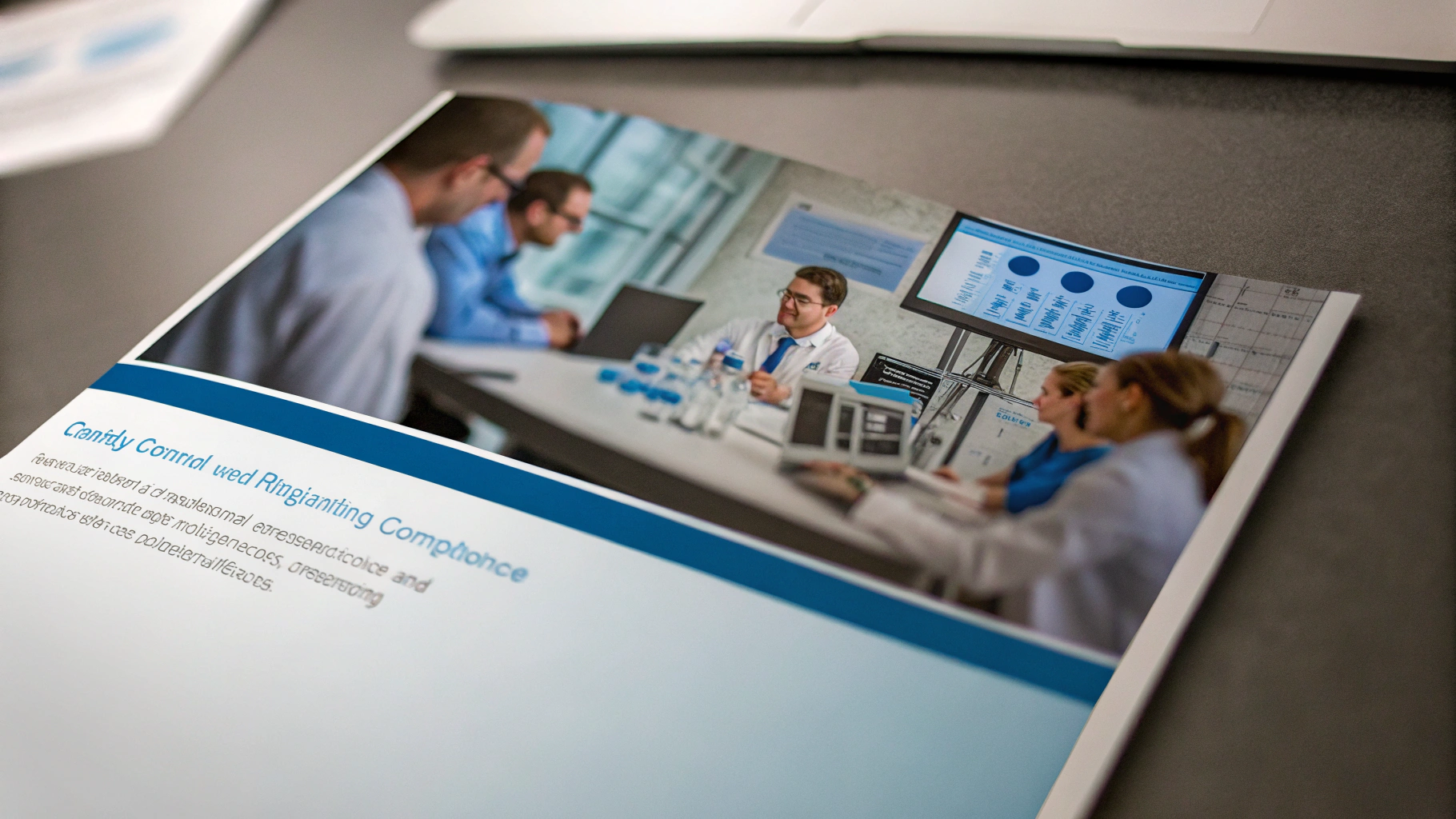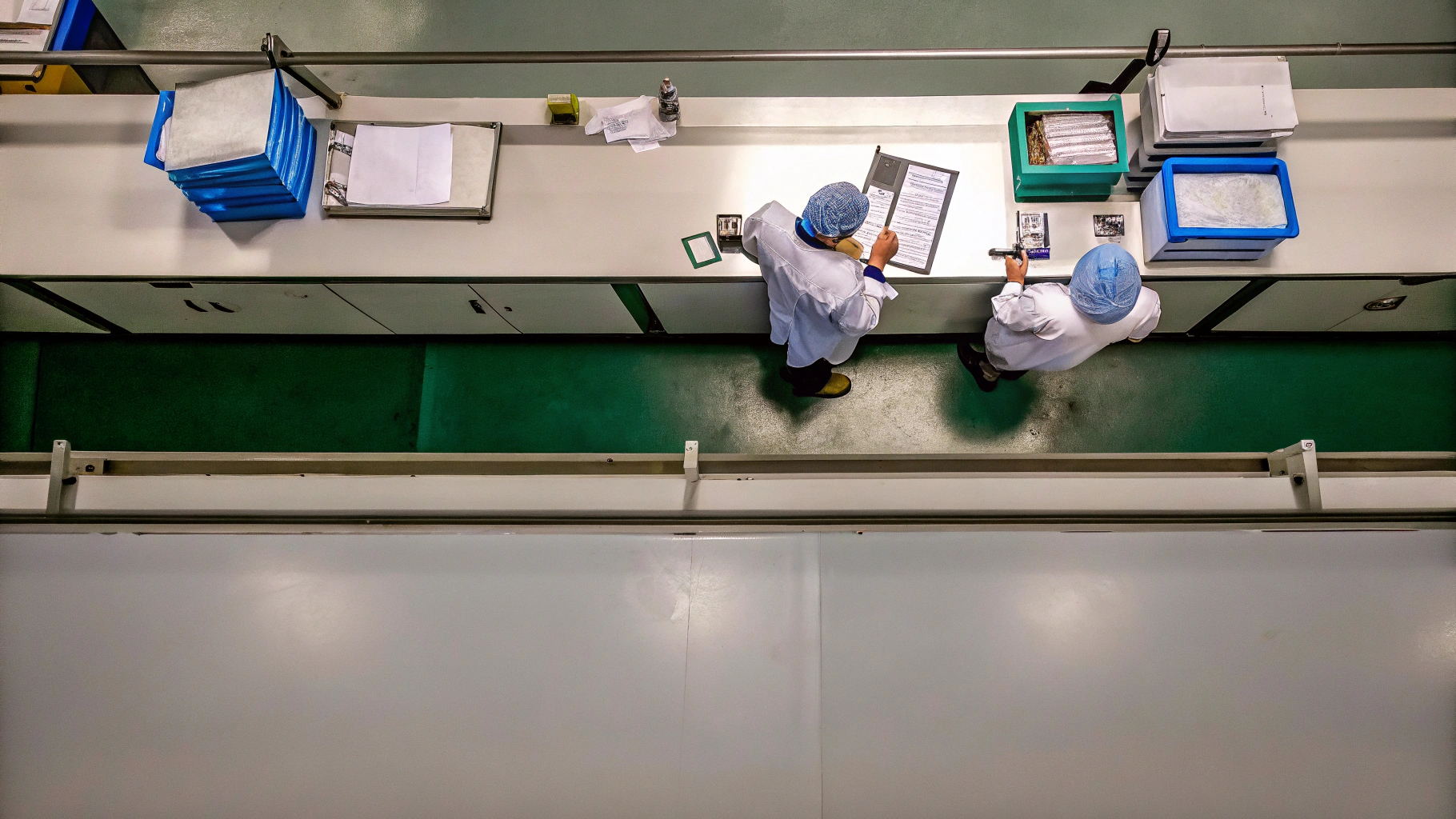10 Essential Insights for Effective Pharmaceutical Quality Control

Overview
This article provides essential insights into effective pharmaceutical quality control, highlighting the critical nature of best practices such as:
- Robust training programs
- Thorough documentation
- Regular audits
- Proactive deviation management
- Integration with regulatory frameworks
These insights are not merely theoretical; they are substantiated by compelling examples from AVS Life Sciences. By implementing these strategies, organizations can achieve improved compliance, enhance operational efficiency, and ensure the delivery of safe and effective pharmaceutical products.
The challenges in compliance are significant, yet they can be effectively addressed through a structured approach. By focusing on best practices, companies can navigate the complexities of regulatory requirements and foster a culture of quality. The case studies from AVS Life Sciences illustrate how these strategies are not only effective but also essential for maintaining high standards in pharmaceutical production.
In conclusion, the insights presented here serve as actionable guidance for compliance officers and industry professionals. Engaging with AVS Life Sciences can provide the necessary support to implement these best practices, ultimately leading to a more compliant and efficient operational framework.
Introduction
The pharmaceutical industry is navigating an increasingly complex landscape, where the stakes for quality control have never been higher. With the global market for pharmaceutical quality control projected to surge to $18 billion by 2032, organizations are under pressure to enhance their compliance measures and operational standards. This article delves into ten essential insights that will empower companies to elevate their pharmaceutical quality control processes, addressing the pressing challenges of regulatory scrutiny and the pursuit of excellence.
How can organizations not only meet but exceed these evolving standards to ensure patient safety and product reliability?
AVS Life Sciences: Comprehensive Expertise in Pharmaceutical Quality Control
AVS Life Sciences stands at the forefront of pharmaceutical quality control, addressing critical compliance challenges with a comprehensive suite of services, including validation, compliance consulting, and engineering support. With a dedicated team of over 300 seasoned professionals, the company equips clients to navigate the complexities of the pharmaceutical landscape, ensuring unwavering adherence to industry standards and regulatory mandates.
The global pharmaceutical standards control market, valued at approximately $11 billion in 2023, is poised for significant growth, with an expected compound annual growth rate (CAGR) of 10.23%, projected to reach $18 billion by 2032. This remarkable expansion underscores the escalating demand for effective compliance solutions as the sector grapples with heightened regulatory scrutiny and the imperative for superior pharmaceutical quality control in products.
AVS Life Sciences' unwavering commitment to innovation and client satisfaction is evident in its tailored strategies that adeptly tackle the unique challenges faced by organizations within the life sciences sector. By harnessing cutting-edge technologies and delivering comprehensive consulting services, AVS Life Sciences not only bolsters compliance but also cultivates operational excellence in pharmaceutical quality control, establishing itself as a trusted ally in the dynamic pharmaceutical landscape.
In this evolving environment, engaging with AVS Life Sciences is not merely advantageous; it is essential for organizations aiming to thrive amidst increasing regulatory demands. With proven success in navigating compliance projects, AVS Life Sciences exemplifies the expertise and dedication necessary to excel in pharmaceutical quality control and meet the challenges of today’s pharmaceutical industry.

Quality Assurance vs. Quality Control: Key Differences Explained
Quality Assurance (QA) encompasses systematic processes designed to ensure that standards are consistently met throughout the product lifecycle, emphasizing defect prevention. In contrast, Quality Control (QC) focuses on operational methods and actions aimed at meeting these standards, primarily through thorough testing and examination of final products. Understanding this distinction is crucial for pharmaceutical companies, as effective pharmaceutical quality control systems depend on recognizing these differences.
The importance of QA is highlighted by its role in safeguarding public health; adherence to Good Manufacturing Practices (GMP), Good Laboratory Practices (GLP), and Good Clinical Practices (GCP) is essential for regulatory approval from agencies such as the U.S. FDA and the European Medicines Agency (EMA). For instance, neglecting QA can lead to severe consequences, including product recalls and legal repercussions. Industry experts emphasize that the safety of the public must always be the top priority.
Statistics indicate that a robust QA framework can significantly reduce the risk of defects, thereby enhancing product reliability. Companies implementing comprehensive QA strategies often experience fewer compliance issues and improved operational efficiency. Effective management systems, like those seen in leading pharmaceutical companies, integrate QA and QC processes to ensure that every product meets stringent safety and efficacy standards.
Management specialists underscore the interdependence of QA and QC: 'QA creates the framework to prevent problems, while QC actively verifies that outputs meet the set standards.' This synergy is vital for maintaining high-quality standards and ensuring that innovative therapies reach the market safely and efficiently. By embracing cutting-edge technologies and flexible practices, the pharmaceutical sector can enhance its assurance efforts, ultimately benefiting patient safety and adherence to standards.
Understanding Good Manufacturing Practices (GMP) in Quality Control
Good Manufacturing Practices (GMP) represent a comprehensive set of guidelines that ensure products are consistently produced and managed according to excellence standards. These practices encompass every aspect of production, from the selection of raw materials to the environment in which products are manufactured. By adhering to GMP, organizations significantly reduce risks, guarantee product safety, and uphold rigorous standards. This commitment ultimately results in superior products that meet both regulatory requirements and consumer expectations, reinforcing the importance of compliance in today's competitive landscape.

The Importance of Documentation and Recordkeeping in Quality Control
Efficient documentation and recordkeeping are paramount in demonstrating adherence to regulatory standards and ensuring traceability throughout the pharmaceutical quality control process. This necessitates the meticulous maintenance of records concerning production methods, quality assurance tests, and any discrepancies encountered. Proper documentation not only streamlines audits and inspections but also serves as a critical resource for continuous improvement initiatives within organizations.
Best practices for recordkeeping in the pharmaceutical industry mandate that all data is attributable, legible, contemporaneous, original, and accurate—principles encapsulated in the ALCOA framework. For instance, every entry must be documented at the time of the activity, with clear identification of the individual responsible for the data. Additionally, maintaining a consistent sequence of events with dated or timestamped records is essential for establishing data integrity.
Statistics indicate that a significant number of audit findings in pharmaceuticals highlight the necessity for rigorous adherence to recordkeeping protocols, which is essential for effective pharmaceutical quality control. Companies that implement robust documentation strategies not only enhance compliance but also cultivate a culture of accountability and transparency.
Examples of effective recordkeeping practices include:
- The utilization of validated electronic systems for data capture and storage
- Ensuring that all records are adequately backed up and archived
- Conducting regular audits of their documentation processes to identify and rectify any potential gaps
By prioritizing these best practices, life sciences firms can significantly mitigate risks associated with oversight and enhance their overall control measures.
Training and Competency Programs: Ensuring Quality Control Effectiveness
Strong training and skill development programs are essential for effective pharmaceutical quality control in the pharmaceutical sector, especially concerning GXP compliance and GMP adherence. These programs must encompass regulatory requirements, performance standards, and specific operational procedures—such as GMP audits and data integrity practices—to ensure a comprehensive understanding of FDA regulations among employees. Investing in employee development not only enhances workforce capabilities but also significantly reduces errors, fostering a culture of excellence that permeates all organizational levels.
Current trends indicate a shift towards more engaging and hands-on training techniques, which have proven successful in boosting employee involvement and retention of critical management skills. For instance, organizations are increasingly implementing competency frameworks aligned with industry standards, ensuring that employees are well-prepared to meet evolving regulatory demands, including those pertaining to APIs, drug products, and testing facilities.
Insights from industry leaders underscore the necessity of continuous learning and adaptation within competency programs, particularly in response to the rapid changes in pharmaceutical regulations and technologies, including adherence to standard operating procedures (SOPs). By prioritizing these training initiatives, companies can enhance their processes for pharmaceutical quality control, ultimately leading to improved product standards and compliance.

Audits and Inspections: Critical Components of Quality Control
Regular audits and inspections are essential for evaluating the effectiveness of pharmaceutical quality control systems within the pharmaceutical industry. These assessments not only assist organizations in recognizing non-conformities but also ensure adherence to pharmaceutical quality control, Good Manufacturing Practices (GMP), and other legal obligations. Preparing for audits necessitates thorough internal assessments, focused employee training, and meticulous documentation to demonstrate compliance with established performance standards. As oversight increases, organizations that prioritize frequent audits can significantly enhance their adherence to standards and operational effectiveness.
For instance, companies that have integrated regular audits into their management systems have reported improved compliance results and a reduction in regulatory citations. This proactive approach to pharmaceutical quality control mitigates risks and cultivates a culture of continuous improvement, ultimately resulting in superior product quality and enhanced patient safety. By embracing these strategies, organizations position themselves to not only meet compliance requirements but also to excel in their operational goals.

Managing Deviations and Corrective Actions in Quality Control
Variations from established procedures frequently occur in manufacturing settings, especially in the context of pharmaceutical quality control within the pharmaceutical industry. To effectively manage these deviations, organizations must prioritize:
- Identifying root causes
- Implementing corrective actions
- Meticulously documenting the entire process
A robust pharmaceutical quality control system is crucial, including clear procedures for reporting, investigating, and addressing deviations to prevent recurrence and uphold compliance with standards.
For instance, a case study involving AVS Life Sciences highlights the critical need to address quality control challenges. A prominent biotechnology firm faced significant hurdles with their laboratory operations, which are vital in heavily regulated sectors. AVS Life Sciences played a pivotal role in upgrading their manufacturing space from a Biosafety Level 1 GMP facility to a Level 2 GMP facility, ensuring compliance and reliability in their outputs. During this process, anomalies in test results were discovered due to incorrectly installed barcode scanner cameras, which initially produced misleading outcomes. This oversight was rectified through comprehensive investigations, including:
- The repair of the barcode scanner cameras
- The implementation of additional checks to ensure proper installation
This resulted in significant lessons learned and enhancements in control processes.
Corrective actions encompassed not only repairing the identified issues but also instituting preventive measures to guarantee consistent operation. Such proactive methods are essential for ensuring pharmaceutical quality control and regulatory adherence.
Industry leaders underscore the importance of thorough investigations and the utilization of root cause analysis tools, such as the '5 Why's' method and Fishbone diagrams, to identify underlying issues. These tools facilitate efficient corrective measures, which are vital for upholding standards in control. In fact, organizations that adopt comprehensive systems for pharmaceutical quality control report a notable improvement in compliance statistics, with many achieving zero findings during audits.
Recent developments underscore the growing reliance on effective event management software to enhance deviation tracking and reporting. This technology boosts efficiency by automating processes, allowing assurance teams to focus on critical investigations rather than administrative tasks. As the industry evolves, the integration of innovative solutions and a culture of continuous improvement will be essential for managing the complexities of pharmaceutical quality control in the pharmaceutical landscape.

Integrating Quality Control Systems with Regulatory Frameworks
Incorporating control systems with governing frameworks is essential for organizations striving to maintain compliance while enhancing their operations. AVS Life Sciences, your dedicated partner for comprehensive regulatory and excellence solutions, underscores the importance of aligning internal processes with external regulations, such as GMP and ISO standards. By developing a unified management system, organizations can streamline their regulatory efforts, reduce redundancies, and elevate overall product standards. This approach ensures compliance with the highest benchmarks in the life sciences sector, ultimately fostering a culture of excellence and accountability.
Organizations face significant compliance challenges in today’s complex regulatory landscape. However, AVS Life Sciences offers tailored solutions that not only address these challenges but also drive operational efficiency. Our expertise in integrating control systems with established frameworks enables organizations to navigate regulatory requirements seamlessly.
By partnering with AVS Life Sciences, organizations can take proactive steps towards achieving compliance. We provide actionable insights and support throughout the compliance journey, empowering teams to embrace best practices and exceed regulatory expectations. Together, we can ensure that your organization not only meets but surpasses industry standards.

Navigating Evolving Challenges in Pharmaceutical Quality Control
The pharmaceutical environment is undergoing rapid transformations, presenting organizations with significant challenges in maintaining pharmaceutical quality control. Key factors influencing this landscape include evolving regulations, technological advancements, and shifting market demands. To uphold compliance and ensure pharmaceutical quality control, organizations must remain vigilant about these developments, especially regarding GXP standards and FDA regulations. Proactively evaluating control systems is crucial to adapt to emerging trends, such as the integration of Process Analytical Technologies (PAT), which facilitate real-time monitoring of Critical Quality Attributes (CQAs) during production. This technology not only elevates product standards but also supports continuous manufacturing, thereby minimizing waste and enhancing efficiency.
Industry leaders underscore the importance of adopting digital tools and automation to refine management processes. For instance, companies are increasingly investing in AI-driven solutions to anticipate potential issues, transitioning from reactive to predictive control models. Notably, organizations like Takeda and Pfizer are effectively leveraging data and AI to enhance customer interactions and adherence, showcasing the success of a comprehensive management strategy.
As regulatory standards continue to evolve, organizations must adjust their strategies accordingly. The shift towards personalized medicine necessitates a reassessment of traditional manufacturing models, prompting many companies to explore decentralized manufacturing approaches that better respond to patient needs. By fostering collaboration among stakeholders and investing in innovative technologies, pharmaceutical companies can adeptly navigate challenges related to pharmaceutical quality control, ensuring they remain competitive in a swiftly changing industry.
Furthermore, addressing Data Integrity Deviations, conducting thorough Investigations, and implementing Corrective and Preventive Actions (CAPA) are vital for maintaining standards and guaranteeing product excellence. Exceptional documentation practices and technical writing are also critical components of effective management systems. AVS Life Sciences stands out as a leading provider of management and regulatory compliance solutions, offering expert guidance in GMP compliance, validation, and engineering tailored for the pharmaceutical and biotechnology sectors.
Key Takeaways and Best Practices for Effective Pharmaceutical Quality Control
To ensure effective pharmaceutical quality control, organizations must adopt best practices that address compliance challenges head-on:
-
Implement Robust Training Programs: Comprehensive training and competency development are essential for enhancing employee skills. Programs should cover vital subjects like Lean Six Sigma techniques, which encompass process variation and root cause analysis, empowering staff in the management of standards. AVS Life Sciences exemplifies this commitment through collaborative efforts with clients, ensuring teams are well-prepared to tackle intricate challenges.
-
Maintain Thorough Documentation: Effective recordkeeping is vital for supporting regulatory efforts. Documentation must encompass all elements of control processes, enabling organizations to demonstrate compliance with Good Manufacturing Practices (GMP) and regulatory requirements. A recent case study illustrates how AVS Life Sciences successfully aided a biotechnology client in enhancing their facility, where meticulous documentation was essential for demonstrating full traceability and adherence, ultimately resulting in improved operational metrics.
-
Conduct Regular Audits and Inspections: Routine audits are instrumental in identifying areas for enhancement and ensuring that standards are consistently met. These evaluations, frequently conducted by skilled experts, can uncover adherence gaps and enable corrective measures. AVS Life Sciences' expertise in performing comprehensive audits has shown beneficial effects in improving operational efficiency and adherence, leading to a quantifiable rise in assurance outcomes.
-
Establish a Proactive Deviation Management System: Organizations should implement systems to manage deviations effectively. This includes promptly identifying non-conformities and employing root cause analysis to prevent recurrence, thereby maintaining product integrity. Insights from AVS Life Sciences' case study underscore the importance of addressing discrepancies in test results to enhance overall assurance processes, potentially leading to a decrease in error rates.
-
Integrate Quality Control with Governance Frameworks: Aligning quality control systems with legal requirements streamlines adherence and enhances operational efficiency. This integration ensures organizations can navigate complex compliance environments while upholding high-quality standards. AVS Life Sciences' expertise in regulatory compliance supports clients in achieving these objectives, resulting in faster approval times for new products.
-
Understand Control Limits: Control limits are typically established at ±3 standard deviations from the mean, which is essential for maintaining stability. They assist in distinguishing between common cause variation, inherent to the system, and special cause variation, indicating that the system is out of control.
By adopting these practices, organizations can significantly enhance their pharmaceutical quality control processes, ensuring the delivery of safe and effective pharmaceutical products. The influence of training and documentation on control effectiveness cannot be overstated, as they form the backbone of a strong management system. Successful organizations exemplifying these strategies, such as those supported by AVS Life Sciences, demonstrate that a commitment to quality is not merely a regulatory requirement but a pathway to operational excellence.

Conclusion
The landscape of pharmaceutical quality control is intricate and continually evolving, necessitating a robust approach to ensure compliance and product integrity. The insights presented in this article highlight the critical importance of implementing best practices, such as:
- Comprehensive training programs
- Thorough documentation
- Regular audits
- Effective deviation management
By integrating these strategies, organizations can not only meet regulatory requirements but also elevate their operational standards, ultimately benefiting patient safety and product reliability.
Key arguments throughout the article emphasize the necessity of understanding the distinctions between quality assurance and quality control, the role of Good Manufacturing Practices (GMP), and the importance of maintaining meticulous records. Additionally, the effective management of deviations and the alignment of quality control systems with regulatory frameworks are crucial for sustaining compliance in an increasingly complex environment. These insights underline the need for a proactive stance in navigating the challenges that the pharmaceutical sector faces today.
In conclusion, the commitment to excellence in pharmaceutical quality control is not merely a regulatory obligation but a vital component of operational success. Organizations are encouraged to embrace these best practices and leverage the expertise of partners like AVS Life Sciences to enhance their quality control systems. By doing so, they can ensure the delivery of safe and effective pharmaceutical products while positioning themselves favorably in a competitive market. The journey towards excellence in quality control is ongoing, and it is imperative for organizations to remain vigilant and adaptable in the face of emerging challenges.
Frequently Asked Questions
What services does AVS Life Sciences provide in pharmaceutical quality control?
AVS Life Sciences offers a comprehensive suite of services including validation, compliance consulting, and engineering support to address critical compliance challenges in pharmaceutical quality control.
How many professionals are part of the AVS Life Sciences team?
The AVS Life Sciences team consists of over 300 seasoned professionals.
What is the current market value of the global pharmaceutical standards control market?
The global pharmaceutical standards control market is valued at approximately $11 billion in 2023.
What is the projected growth rate for the pharmaceutical standards control market?
The market is projected to experience a compound annual growth rate (CAGR) of 10.23%, expected to reach $18 billion by 2032.
Why is engaging with AVS Life Sciences essential for organizations in the pharmaceutical sector?
Engaging with AVS Life Sciences is essential for organizations aiming to thrive amidst increasing regulatory demands and to navigate the complexities of compliance projects successfully.
What is the difference between Quality Assurance (QA) and Quality Control (QC)?
Quality Assurance (QA) involves systematic processes to ensure standards are met throughout the product lifecycle, focusing on defect prevention, while Quality Control (QC) focuses on operational methods and actions to meet these standards through testing and examination of final products.
Why is Quality Assurance important in the pharmaceutical industry?
Quality Assurance is crucial for safeguarding public health, as it ensures adherence to Good Manufacturing Practices (GMP), Good Laboratory Practices (GLP), and Good Clinical Practices (GCP), which are essential for regulatory approvals.
What are the consequences of neglecting Quality Assurance?
Neglecting Quality Assurance can lead to severe consequences, including product recalls and legal repercussions.
How can a robust Quality Assurance framework benefit pharmaceutical companies?
A robust QA framework can significantly reduce the risk of defects, enhance product reliability, and lead to fewer compliance issues and improved operational efficiency.
What are Good Manufacturing Practices (GMP)?
Good Manufacturing Practices (GMP) are a comprehensive set of guidelines that ensure products are consistently produced and managed according to excellence standards, covering all aspects of production from raw material selection to the manufacturing environment.
How do GMP contribute to product safety?
By adhering to GMP, organizations can significantly reduce risks, guarantee product safety, and uphold rigorous standards, resulting in superior products that meet regulatory requirements and consumer expectations.
